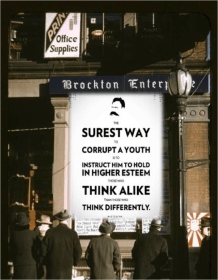JANUARY 25, 2016 News Release
Archive for January, 2016
Latest News
-
-
JANUARY 25, 2016 Dispatches
Dispatches: Ecuador Should Drop Terrorism Charges Against Activists
-
JANUARY 25, 2016 Dispatches
Dispatches: Mozambique’s Double Speak on LGBT Rights
-
JANUARY 24, 2016 News Release
Kyrgyzstan: Ensure Accountability in Torture Case
-
JANUARY 24, 2016 News Release
Libya: Civilian Toll Mounts in Benghazi
-
JANUARY 24, 2016 News Release
Iran: Threats to Free, Fair Elections
-
JANUARY 22, 2016 News Release
Kazakhstan: Prison Time for Facebook Posts
-
JANUARY 22, 2016 Commentary
Top Human Rights Tweets of the Week
-
JANUARY 22, 2016 News Release
Burma: Political Prisoner Amnesty Falls Short
SEE MORE
Human Rights Watch is a nonprofit, nongovernmental human rights organization made up of roughly 400 staff members around the globe. Its staff consists of human rights professionals including country experts, lawyers, journalists, and academics of diverse backgrounds and nationalities. Established in 1978, Human Rights Watch is known for its accurate fact-finding, impartial reporting, effective use of media, and targeted advocacy, often in partnership with local human rights groups. Each year, Human Rights Watch publishes more than 100 reports and briefings on human rights conditions in some 90 countries, generating extensive coverage in local and international media. With the leverage this brings, Human Rights Watch meets with governments, the United Nations, regional groups like the African Union and the European Union, financial institutions, and corporations to press for changes in policy and practice that promote human rights and justice around the world.
Watch a video about Human Rights Watch and how we work:
This video features two Human Rights Watch investigations in 2013, including the al-Bayda massacre and the Ghouta attacks.
|
TOP STORIES THIS WEEK
|
|
Iowans have a long history of breaking from party orthodoxy. Our reporting from the state shows that could be good news for Sanders on February 1.
BY THEO ANDERSON
This is what neoliberal governance looks like.
BY JACOB LEDERMAN
Paul Mason, ardent critic of neoliberalism, sees a new epoch ahead.
BY PETER S. GROSVENOR
Why the American Hero trope is so dangerous.
BY SUSAN J. DOUGLAS
New York’s ‘Carwasheros’ Push for Safer, Fairer Workplaces Car washes are the ‘wild, wild West” of workplace regulation. The Car Wash Accountability Act will improve that–if it is ever implemented.
Author Jeff Halper says the usual explanations of Israel’s behavior didn’t make sense to him.
BY MARC DAALDER
It’s no coincidence that Trump, the candidate least in need of money or media attention, is the most outspoken against war.
BY LEONARD C. GOODMAN
The Lessons of Syriza’s Failed Push Against Austerity
Austerity policies haven’t worked in Greece, but neither have the radical Left’s efforts to push back against them.
BY BRANKO MARCETIC
The Newspaper That Transformed Black America–And The Course of History
How an ambitious migrant came to Chicago and changed history with the power of journalism.
BY SALIM MUWAKKIL
The grassroots is taking charge of Sanders’ campaign–and they’re not waiting around for the establishment.
BY JIM HIGHTOWER
What a legacy.
BY JOE CONASON
|
| WORKING IN THESE TIMES |
| Bernie Sanders and Unions’ Relationship Status: It’s Complicated
Many union members say Bernie Sanders should be labor’s choice for president. But convincing unions to endorse him isn’t so simple.
BY DAVID MOBERG
|
| RURAL AMERICA |
|
Communities today face not just the behavior of individual corporations, but a system of law that insulates corporate power from democratic control.
BY THOMAS LINZEY
|
What Leaders Must Do to Battle Bigotry
Prejudice lies deep in the brain, but leaders can set the stage to help us overcome it.
Altruism is SexyIn a new study, a kind heart trumps good looks—but the combination of both is the most desirable of all.
When Kindness Helps Teens (and When It Doesn’t)According to a new study, we can predict whether teens will get into trouble by how nice they are to strangers.
Don’t Let Your Mind Be Your Worst EnemyTwo new books reveal the inner workings of human psychology–biases, rationalizations, and all.
FRONTIERS OF PSYCHOTHERAPIST DEVELOPMENT
Introduction:
We are in the business of growth and change. If we are to be helpful to those whom we serve, it’s our imperative to continuously development.
The Frontiers of Psychotherapist Development (FPD) blog is about pushing beyond the edge of your development. When we grow, our clients benefit.
Practical ideas pulled together from the studies of expertise and expert performance in a variety of professional fields*, teaching & education, cognitive science, aesthetic arts, as well as from psychotherapy research, will be shared on regular basis.
Subscribe to FPD blog for regular updates. You might want to go to Start Here for a sample of the blogposts. Any comments about this is greatly appreciated.
Your email will be treated with confidentiality. No spams, I promise.
Cheers to your on-going development!
Daryl Chow Ph.D
For Information about Daryl Chow Ph.D., click HERE.
::: click here or above to access and subscribe to The Frontiers of Psychotherapist Development (FPD) blog :::
RECENT POSTS
The Coalition government’s war on renewables has slowed clean energy investment, undermining jobs, raising emissions, and making the task to clean up Australia’s energy sector far harder. New data from Bloomberg New Energy Finance has highlighted the damage a government determined to fight the future can do, with the Abbott-led Coalition government overseeing a two-year stall in investments in large scale renewables. While the situation has marginally improved under Malcolm Turnbull’s leadership, it remains party policy to abolish the Clean Energy Finance Corporation and the Australian Renewable Energy Agency. This means confidence in the sector is likely to remain lacking, making the job of reaching the Renewable Energy Target harder, and hurting job development in a sector that the US, for example, has seen surge to employing 77 per cent more workers than coal mining.
Despite Coalition roadblocks, the renewable transition is still hastening in Australia as it is around the world. While large scale renewable investment has taken a hit, solar PV continues to boom in Australia, with bloomberg finding it attracted the fifth largest investment in small-scale PV in 2015 globall. $2.17 billion was spent on solar last year, putting Australia ahead of Germany, and behind the UK and Japan. Considering Australia is expected to become a world leader in the deployment of battery storage, it is hard to imagine anything but further booming growth for renewables ahead.
Cheap oil and gas are not stopping renewable development. While the Australian government has worked to slow renewable development and protect coal, wind and solar have ‘done the unthinkable’ and trumped fossil fuels to boom to record levels of investment in 2015. The reality is the renewable transition is inevitable, unstoppable, and as new Bloomberg data shows – happening faster than many (particularly those in the fossil industry) could have imagined. This transition will only hasten further as the Paris Effect sinks in.
Resources
Related Coverage
- Confidence in renewable energy sector ‘evaporated’ after Abbott cut: Bloomberg (Sydney Morning Herald)
- Renewable energy investment in Australia way behind target, analysis finds (Sydney Morning Herald)
- Clean Energy Defies Fossil Fuel Price Crash to Attract Record $329bn Global Investment In 2015 (MarketWatch)
- Solar and Wind Just Did the Unthinkable (Bloomberg)
- ARENA tender suggests solar PV costs to fall below $A100/MWh (RenewEconomy)
- U.S Solar Jobs Boom While Oil, Coal Struggle (Fortune.com)
|
TOP STORIES THIS WEEK
|
|
WORKING IN THESE TIMES
|
Challenges and problems can derail your creative process … or they can make you more creative than ever. In the surprising story behind the best-selling solo piano album of all time, Tim Harford may just convince you of the advantages of having to work with a little mess.
Articles of Note
In awe of his older brother, William, Henry James declared himself inadequate — to his family, as well as to the times. It improved his writing markedly… more »
The first email was sent in 1971. Since then email has gone from obscure to beloved to barely tolerated. Yet it endures. Why?… more »
All roads of American modernism didn’t run through James Laughlin, but many of them intersected there… more »
Arts & Letters Daily is brought to you by
The Chronicle of Higher Education
Current issue: January 2016
…France, assault on liberties, FN rise; EU Schengen under threat; special report, Latin America’s right turn; Tunisia five years on; US primaries socialism gets a voice; Korean reunification, a waiting game; Africa, presidents for life, Benin’s black market; US tough-on-crime sheriffs; Cross and Crescent…
::: click here or cover to access…English language :::
excerpt:
With over a billion users, Facebook is changing the social life of our species. Cultural commentators ponder the effects. Is it bringing us together or tearing us apart? Psychologists have responded too – Google Scholar lists more than 27,000 references with Facebook in the title. Common topics for study are links between Facebook use and personality, and whether the network alleviates or fosters loneliness. The torrent of new data is overwhelming and much of it appears contradictory. Here is the psychology of Facebook, digested:
Is Facebook making us lonely and sad?
This is the crunch question that has probably attracted the most newspaper column inches (and books). A 2012 study took an experimental approach. One group were asked to post more updates than usual for one week – this led them to feel less lonely and more connected to their friends. Similarly, a survey of over a thousand FB users found links between use of the network and greater feelings of belonging and confidence in keeping up with friends, especially for people with low self-esteem. Another study from 2010 found that shy students who use FB feel closer to their friends (on FB) and have a greater sense of social support. A similar story is told by a 2013 paper that said feelings of FB connectedness were associated with “with lower depression and anxiety and greater satisfaction with life” and that Facebook “may act as a separate social medium …. with a range of positive psychological outcomes.” This recent report also suggested the site can help revive old relationships.Yet there’s also evidence for the negative influence of FB. A 2013 study texted people through the day, to see how they felt before and after using FB…
::: click here for this extensive piece in full + open access @ BPS Research Digest :::






































